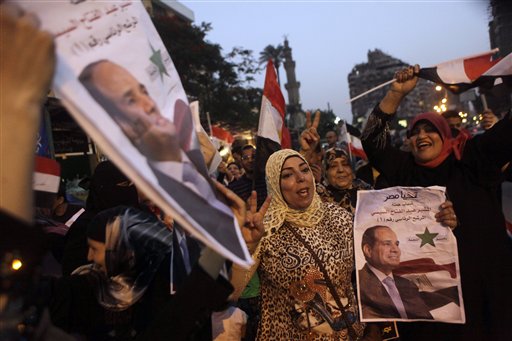CAIRO (AP) — Egyptian authorities scrambled to rescue the country’s presidential election from the embarrassment of low voter turnout, but few people trickled to the polls Wednesday even after the balloting was extended for a third day.
A low turnout will likely rob the all-but-certain winner, former army chief Abdel-Fattah el-Sissi, of the overwhelming show of public support he sought in the vote.
Turnout is key for el-Sissi, because he is looking to prove to critics at home and abroad that his ouster last July of the nation’s first freely elected president, the Islamist Mohammed Morsi, reflected the will of the people.
Only a handful of voters or none at all were at polling centers in three districts toured by an Associated Press reporter Wednesday morning. TV Images beamed live from more than a dozen locations across Egypt showed very few voters at polling centers. In some cases, none.
Opponents say the lack of enthusiasm at the polls reflects deep discontent with el-Sissi, not just among his Islamist foes but also among a broader section of the public that says he has no solutions for Egypt’s woes and fears he will return Egypt to the autocratic ways of Hosni Mubarak.
El-Sissi’s supporters in the Egyptian media — which have been cheerleaders for the retired field marshal since his toppling of Morsi — have been in a panic. Political talk show hosts and newscasters have been berating people to vote, warning that otherwise the Brotherhood will be encouraged to step up its challenge to the new government.
Prominent TV talk show host Amr Adeeb angrily said that by not voting, Egyptians might as well “go directly to the prison and return Mohammed Morsi to power. Tell him ‘Your excellency, President Mohammed Morsi, please come out and rule us.'”
The abrupt decision by the election commission Tuesday to add another day of voting also raised complaints that authorities were tipping the playing field in el-Sissi’s favor.
U.S.-based Democracy International, which has been observing the vote, said Wednesday that the extension “raises more questions about the independence of the election commission, the impartiality of the government, and the integrity of Egypt’s electoral process.”
It said its observer teams outside of Cairo had ended their mission as scheduled Tuesday, meaning they would not be observing polls Wednesday. Some other international monitoring teams also left the country, since they had only planned for two days of voting, though EU monitors continued to observe.
The campaign of el-Sissi’s sole opponent in the race, leftist politician Hamdeen Sabahi, protested the extension, saying it aimed to “distort” the will of the people. It also pulled its representatives from polling stations Wednesday in protest against what it called intimidation and sometimes arrests of its campaign workers.
Even the generally pro-el-Sissi daily Al-Masry Al-Youm appeared to rub salt into the wound. “The state is looking for a vote,” its red-lettered front-page headline said.
The head of the election commission told the MBC-Misr TV station that early estimates put turnout at 35 percent of the nearly 54 million voters in the first two days of voting.
That would be a significant drop from the 2012 election that Morsi won, which had a turnout of just under 52 percent. Sabahi’s campaign, citing its representatives at polling stations, put turnout on Monday at only 10 to 15 percent.
The tepid polling is particularly embarrassing because the government and media have been whipping up adulation for el-Sissi the past 10 months, depicting him as the country’s savior and the only person equipped to tackle the country’s pressing problems, from a woeful economy and high unemployment, to surging crime and inflation.
They also have praised his crackdown on Morsi’s Muslim Brotherhood and other Islamist supporters, a campaign that has killed hundreds and put thousands in prison.
TV commentators have been scrambling for explanations.
One is that many decided not to bother to vote since the outcome was a foregone conclusion — few believe that Sabahi could offer a real challenge to el-Sissi. A heat wave Monday and Tuesday and fear of terror attacks have also been cited.
Morsi’s Brotherhood supporters and other Islamists are also boycotting the vote, together with many of the youths who took part in the uprising that toppled Mubarak in 2011.
“Where are the youth? What do they want? Do they want to destroy Egypt?” Said Sayyed, a laundry worker in his 70s, said, bemoaning the boycott.
Of Egypt’s nearly 54 million voters, about 32 million are aged 18-40.
In Cairo’s upscale Zamalek district, a polling center did not have a single voter more than an hour after polls opened Wednesday. Masked army troops looked relaxed standing behind sandbags.
A short distance away, Amani Fikry, a manager in a privately-owned company, said she had voted earlier with her mother.
“People are lazy, depressed or frustrated. They knew what the result will be even before the vote,” she said. “They are exhausted from three years of constant troubles.”

COMMENTS
Please let us know if you're having issues with commenting.